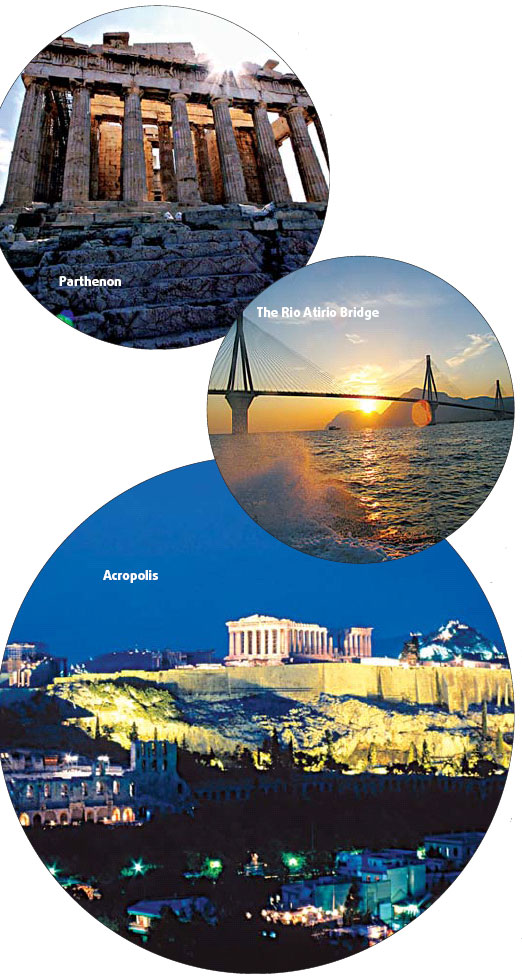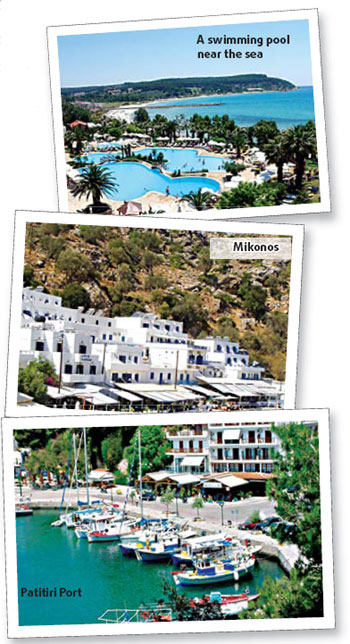World-renowned tourist destination shifting gears

With its unique combination of a warm southern climate, captivating natural beauty, and an exceptionally rich historical and cultural heritage, Greece is a timeless destination that can offer a tourism product which remains but the envy of most other tourism exporting nations.
And indeed, the annual influx of visitors to Greece has for many years exceeded the number of inhabitants.
Last year, Greece broke its own record as the number of tourist arrivals reached 16 million and generated around 12 million euros ($17.2 million) in profits.
The recently appointed Greek Minister of Tourism, Aris Spiliotopoulos comments: "Arrivals to Greece are projected to increase to 20 million by 2010, equivalent to two visitors per Greek. Yet we are not taking anything for granted. It is important to emphasize that times are becoming increasingly demanding for Greek tourism as expectations of all who are involved continue to rise."
Greece ranks in the top 15 destinations worldwide, and tourism constitutes one of the fundamental pillars of local, regional, and national development in the country, by providing jobs, financial sustainability, and attracting new capital investments.
The total contribution of the industry to the Greek economy in 2006 has been estimated at 37.2 billion euro ($54.87 billion), equivalent to 18 percent of gross domestic product (GDP), a figure which the World Travel and Tourism Council expects to almost double over the next decade.
During the period of 2006-2007, the sector was responsible for around 42 percent of the 200,000 new private sector jobs created in Greece.
It remains to be seen to which extent the wildfires that ravaged large territories of western Peloponnese and Evia in the summer of 2007 have slowed down the development of Greece's tourism industry.
However, the Greek Ministry of Tourism has announced that none of the country's main tourism facilities have been damaged by the fires.
Short-term and mid-term programs were quickly launched to preserve the attractiveness of the areas affected.
Building upon its successful hosting of the Olympic Games in 2004, Greece has been pushing ahead with an international campaign aimed at repositioning the country in the world map of tourism.
The establishment of the Greek Ministry of Tourism in 2004 constituted an important step towards upgrading Greece's position as a tourism destination and developing a new identity and brand for the country.
Responsible for regulation, planning and programming, the Greek Ministry of Tourism has several executing agencies under its jurisdiction, such as the Greek National Tourism Organization for promotion and licensing of tourism enterprises, the Tourism Development Company for managing tourist real estate, and the Organisation for Tourism Education and Training.
While reinforcing its positive image and reputation as a safe and ideal destination, Greece is aiming to attract higher spending tourists throughout the year by developing conference tourism, city breaks, spa and medical tourism, yachting, golf, nature-eco-rural tourism, skiing in the mountainous areas of the country, urban tourism and gastronomy.
The general idea is to develop what has been called "an enrichment and reinforcement of the traditional sun and sea model."
Spiliotopoulos explains: "Our main concern is to differentiate ourselves from our competitors and to implement certain practical solutions that will allow us to transform our country into a year-round destination for tourists worldwide. We want to embrace all forms of tourism and most of all establish ourselves as a high-quality product."
In Greece, tourist accommodation is divided among approximately 9,000 hotels (680,000 beds), 364 camping sites (with 31,474 places), and over 459,000 beds in rental rooms.
A high standard of accommodation has become available after the upgrading that took place in preparation for the Olympic Games.
Organizations such as the Olympic Properties SA and the Tourism Development Co have been established to ensure the optimal development and use of Olympic and tourism infrastructure.
The 2004 Olympics have been conducive to developing Greece's MICE (Meetings, Incentives, Conferences and Exhibitions) industry.
Greece today has the infrastructure to hold the most demanding of conferences, and is working further towards this goal.
There are currently around 74 venues for conferences and exhibitions in the country and 446 hotels with such facilities.
One of the Olympic athletic venues is to be developed into a major conference center. The Greek government, through the development law, funds the creation of independent conference centers by up to 50 percent.
Greece's transportation system too has been modernized and has become highly efficient, supporting fast and safe travel all over the country.
New infrastructure projects have been planned, including the establishment of additional connecting routes to facilitate inter- and intra-regional mobility.

Due to the more than 3,000 Greek islands, sea transport is an area that continues to hold great potential.
A program of redevelopment of ports is underway, and new types of sea transport services (fast large vessels but also smaller hydrofoil-type ones) have led to a re-organization of tourism flows, improving accessibility to established tourism destinations and opening up smaller islands to tourism.
Plenty of investment opportunities are arising across the various sub-sectors of the tourism industry that Greece is now developing.
The Greek government is keen to upgrade and diversify its tourism product further, by stimulating investments in the development of hotel complexes, infrastructure, and special purpose facilities such as golf courses, yachting harbours, ski resorts, and convention centers (Yachting, which has become increasingly popular, is identified as an area with a particularly acute need for expanding the existing capacity of 6,500 berths across 20 marinas).
To facilitate such investments, the government has implemented a number of incentives as specified by an investment law, a development law (providing tax breaks or grants for certain types of investment), a law for public-private partnerships, a competition law, and a tax law reducing taxes on profits.
Meanwhile, the development of state-owned tourism real estate property is promoted through the Hellenic Tourism Development Company.
The incentives provided by the investment law for upgrading or withdrawing tourism installations have attracted considerable interest, as evidenced by the fact that out of 1,563 investment plans approved by the Prefectures and the Ministry of Economy and Finance, 454 involved investments in the tourism industry.
By December 2006, the development law covered 620 investments with a total budget of 1.2 billion euros ($1.77 billion), representing 37 percent of total investments.
In 2007 further investments have been made with the dual aim of improving quality of services and differentiating the tourist product.
Greece would like to see more tourist arrivals from East Asia, notably China.
Spiliotopoulos explains: "We are hopeful that many Chinese would like to visit Greece at least once in their life time. Taking into account the huge population, 1.3 billion, the number of tourist arrivals from China can become very significant. Our market is prepared for the coming of Chinese tourists and we are trying to make sure they feel at home in Greece."
Chinese-Greek relations took on new momentum with the passing on of the organization of the Olympic Games to Beijing for 2008.
In January 2006, Greece and China signed a joint declaration calling for the establishment of a Comprehensive Strategic Relationship between the two countries.
This year, on the occasion of the 35th anniversary of the establishment of diplomatic relations with China, Greek Foreign Minister Dora Bakoyannis highlighted the importance of the common point of reference between the two nations, both of which represent great civilizations that have exerted significant influence on Eastern and Western philosophical and scientific thought.
All the photos of the page are sceneries of Santorini island in Greece, which is probably the most popular tourist destinations in Greece. It is one of the most popular destinations for Honeymooners and for weddings too.
(China Daily 12/13/2007 page26)














